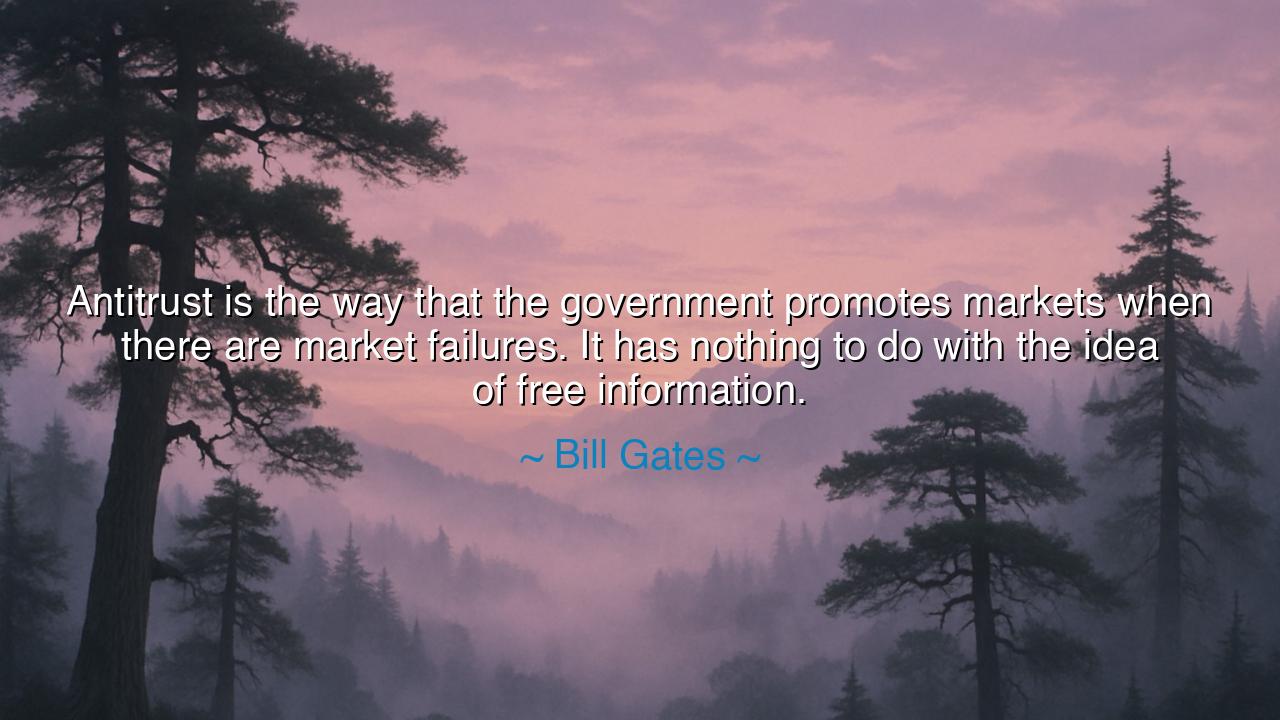
Antitrust is the way that the government promotes markets when
Antitrust is the way that the government promotes markets when there are market failures. It has nothing to do with the idea of free information.






Hear, children of commerce and reason, and lend your minds to the words of Bill Gates, a man who stood at the summit of technological revolution and beheld both the triumph and peril of innovation. He said: “Antitrust is the way that the government promotes markets when there are market failures. It has nothing to do with the idea of free information.” In this statement lies not merely the musings of an industrial titan, but a meditation upon the relationship between power, freedom, and balance—a lesson as old as civilization itself.
In the world of trade and enterprise, the marketplace is a living organism, vibrant when free, but vulnerable when dominated. Antitrust, as Gates explains, is not a punishment of success but a safeguard of competition, a corrective force when the scales of commerce tilt too heavily toward monopoly. Governments, he reminds us, intervene not to restrain creativity, but to restore equilibrium when freedom is endangered by excess. It is a truth as ancient as the fall of empires: unchecked dominance, whether of kings or corporations, suffocates innovation and erodes the vitality of the people.
The origins of Gates’s reflection trace back to his own encounter with the law—the great Microsoft antitrust case of the late 20th century. His company, an emblem of technological prowess, was accused of wielding its dominance to suppress rivals. Gates, through this trial of both reputation and philosophy, came to articulate the distinction between market regulation and the broader, often-misunderstood concept of free information. For the purpose of antitrust law is not to constrain knowledge or the sharing of ideas—it is to ensure that knowledge remains accessible to all who strive to compete in good faith.
History bears many examples of the tension Gates describes. Consider the Standard Oil Company of John D. Rockefeller—a colossus that once controlled the veins of global energy. It brought efficiency and innovation, yet its unchecked power stifled competitors and threatened the market’s very spirit. When the U.S. government intervened in 1911, dividing the company into smaller entities, the act was not one of destruction but of renewal. From this regulation sprang new companies, new ideas, and the continued flourishing of the energy industry. Thus, antitrust law acts not as a blade to sever growth, but as a surgeon’s hand to preserve it.
Yet Gates’s words carry another layer of wisdom: the separation of ideas from power. He warns that the regulation of markets must not be mistaken for censorship or restriction of information. Free information—the open exchange of knowledge, innovation, and communication—is the soul of progress. Governments may step into markets to prevent economic distortion, but they must not silence the currents of thought that sustain human advancement. For when knowledge itself becomes controlled, society slips not into monopoly of business, but into monopoly of mind.
The deeper meaning of his quote lies, therefore, in balance. Just as liberty without law invites chaos, so law without liberty breeds tyranny. Gates’s insight reflects the eternal dance between structure and freedom—between the order that sustains markets and the freedom that inspires creation. A wise society must know when to intervene and when to step back, when to protect competition and when to trust the invisible hand of enterprise.
From this understanding flows a timeless lesson: vigilance and discernment must guide both government and the governed. Citizens should watch with clear eyes the movements of power—whether corporate or political—and demand fairness, transparency, and opportunity. Innovators must pursue greatness with humility, knowing that true success lies not in dominance, but in contribution to the common good. And leaders, both public and private, must remember that prosperity without justice is fleeting, but prosperity grounded in fairness endures.
Thus, let Gates’s words stand as both caution and counsel: that antitrust is not a weapon against innovation, but a shield for freedom—the freedom to compete, to create, and to share in the bounty of human progress. Governments, when wise, use it to preserve the vitality of markets; citizens, when vigilant, uphold it to defend their right to opportunity. In this balance lies the promise of enduring prosperity—the harmony between law and liberty, power and principle, market and mind.






AAdministratorAdministrator
Welcome, honored guests. Please leave a comment, we will respond soon